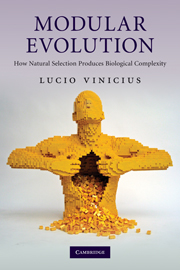Book contents
- Frontmatter
- Contents
- Preface
- 1 From natural selection to the history of nature
- 2 From the units of inheritance to the origin of species
- 3 Multicellularity and the developmental code
- 4 Life cycle evolution: life and death of the soma
- 5 Sex and its consequences: the transition that never happened
- 6 Animal societies: the case of incomplete evolutionary transitions
- 7 The new ‘Chain of Being’: hierarchical evolution and biological complexity
- References
- Index
7 - The new ‘Chain of Being’: hierarchical evolution and biological complexity
Published online by Cambridge University Press: 05 June 2012
- Frontmatter
- Contents
- Preface
- 1 From natural selection to the history of nature
- 2 From the units of inheritance to the origin of species
- 3 Multicellularity and the developmental code
- 4 Life cycle evolution: life and death of the soma
- 5 Sex and its consequences: the transition that never happened
- 6 Animal societies: the case of incomplete evolutionary transitions
- 7 The new ‘Chain of Being’: hierarchical evolution and biological complexity
- References
- Index
Summary
Selective and historical factors contribute to produce Darwin's ill-defined sentiment that living organisms are more complex now than at earlier stages of the evolution of life. A few theoretical solutions to the problem of complexity in macroevolution have been proposed and have enjoyed some success, the most popular of which being the model of major transitions and the corresponding logic of levels of selection. As seen in previous chapters, multilevel selection and major transitions are incomplete accounts of complexity for a simple reason: they rest upon the idea of aggregation and the part-to-whole argument as the main marker of biological complexity, and for this reason they fail to successfully include processes such as the origin of information-carrying brains and human language into a scheme of evolutionary increases in complexity.
The limitations of the aggregation model do not imply that the idea of evolutionary increases in complexity should be abandoned. A solution presented in this chapter is a change in perspective from an aggregational to a hierarchical view of evolution: instead of using the part-to-whole criterion of complexity, biological complexity could be defined on the basis of a hierarchy of mechanisms of information. This change of perspective reveals the existence of more than one Principle of Order from Order in living organisms and the reasons for the evolution of new inheritance modes from the original genetic code.
Information
- Type
- Chapter
- Information
- Modular EvolutionHow Natural Selection Produces Biological Complexity, pp. 186 - 207Publisher: Cambridge University PressPrint publication year: 2010
Accessibility standard: Unknown
Why this information is here
This section outlines the accessibility features of this content - including support for screen readers, full keyboard navigation and high-contrast display options. This may not be relevant for you.Accessibility Information
- 1
- Cited by
